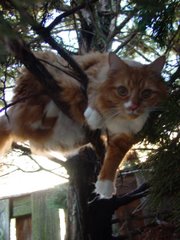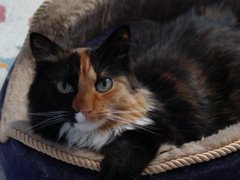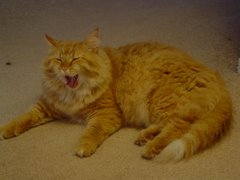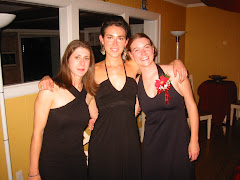Saturday, February 26, 2011
Will the Real Vet School Please Stand Up?
I was on call for anesthesia and due to an 8-hour shunt surgery case earlier in the day, the rest of the surgical cases were late into the OR for the rest of the day. My assigned case rolled into the operating room around 4PM, and for reasons that will go unmentioned, finished at 8:45 PM. The recovery went well, and I headed home for a bowl of cereal and some zzz's. Around 1:36 AM my cell phone rang. A colic (the second of my anesthesia rotation) needs to go to surgery. Luckily, or not, I was sent home around 4 AM to sleep for 2 hours until morning rounds, with the hope I would compete my case for the next day and be released home to finish my sleep.
Murphy's law continued to be in effect that day. We rolled the kitty into the MRI only to find the special MRI-compatible, recently serviced anesthesia machine was leaking some Isoflourane gas. Awesome. 2 hours later the MRI scan began. I was sent home promptly after the case was completed, however, I never got a lunch break and actually got home at 4PM, not very early after all.
On the bright side, I survived and performed better than I thought possible on only two 2 hour sessions of sleep. In fact, I was proud of myself for making it through, despite feeling like a cloud of bad luck was over my head for 36 hours. In addition, I still absolutely love my anesthesia rotation. I am extremely excited to be off the entire weekend. I have found it amazing that while the hospital has seen 4 colics in the past year, 2 have occurred when I am on call in the past 2 weeks. Dropping a horse is exciting, it's just not where I see my career headed, especially when I know first-hand now that colics really do occur in the middle of the night. But if life has taught me anything, it is that you never know where it will take you.
Monday, February 21, 2011
Special Guest Post by Veterinary Technician Tina Marconi
3 Reasons Why Veterinarians Should Honor Thy Veterinarian Technician
Anyone with even the minimal knowledge of the medical field knows that saving lives and curing illnesses is a team effort – no one doctor or other health care professional is able to handle everything by themselves. It’s the same in a veterinary practice – no one can operate a one-man show unless they want to end up becoming overworked and unable to handle their cases with the required care and efficiency. This is why assistants and technicians are hired – to help out with a veterinarian’s practice, and just as nurses are important to the scheme of things in a people hospital, so too are veterinarian techs extremely important in the world of animal care.
Veterinarian’s who think they know it all and so abuse their techs and assistants or treat them badly should remember that unless they respect those who work for them:
· Their practice could go downhill: Veterinarians who don’t respect their assistants and techs could end up losing their services; no one wants to work for employers who don’t treat them well. And when the word gets around that the veterinarian in question can’t hold on to an assistant or technician, his/her practice begins to go downhill because no one wants to work with them. Overworked veterinarians are not effective, they soon start making mistakes, and they end up losing their clients because they are perceived as not being proficient at their job.
· They could lose regular customers: Veterinarian techs are not just responsible for assisting the veterinarian in all his/her tasks; they’re also the ones who liaise with clients, set up appointments and follow-up visits, and provide aftercare for animals that have undergone surgeries or which require hospitalization. So when a veterinarian does not respect his/her veterinarian tech, their unhappiness and dissatisfaction spills over to the client and patients, and soon enough, the regular ones too start looking for other veterinary practices to handle their pets.
· They tend to show the same attitude toward the animals they care for: Veterinarians are perceived to be kind and gentle people, simply because they’ve chosen to work with animals, creatures that cannot talk and must be handled with love and kindness. But if a veterinarian is abusive towards or does not respect the people who work for him/her, it stands to reason that they’re not going to adopt the right attitude when providing care for animals. They could be skilled and well-trained, but the clinical approach does not work well on animals that can sense hostility from a mile away. Veterinarians who are warm human beings make the best kind of animal doctors, and those who fail to respect their veterinarian techs and assistants may as well shut down their practice and find another occupation.
This guest post is contributed by Tina Marconi, she writes on the topic of online veterinarian tech programs . She welcomes your comments at her email id: tinamarconi85[@]gmail[.]com.
Sunday, February 20, 2011
Let the Bittersweet Feelings Begin
I performed my first successful epidural on a live patient Friday and it was very rewarding. I used multimodal pain management for a jaw fracture and the patient's plane of anesthesia was very stable. It was amazing to see how effective multimodal pain control can be. Many people think anesthetic gas=pain control, but it doesn't. Better pain management before, after and during surgery decreases anesthetic complications, the amount of gas needed to keep the patient in a good surgical anesthetic plane, and aids in recovery. Anyway, I have been learning a tremendous amount and loving it. The aspects I like are very applicable to critical care medicine and are making me more curious about a residency in critical care. I feel like I am starting a new career exploration journey in that respect.
As I sat in the small animal OR monitoring anesthesia last week, however, I had a moment when I realized I only had 2 more weeks in the small animal hospital. A wave of sentimental feeling and sadness came over me. In fact, as I spend some of my last days with good friends, I find that this feeling of sentiment for Blacksburg, vet school, vet school relationships and all the nuances of the teaching hospital is very strong. I am doing my best to savor the great things I have experienced the past 4 years. It will be hard to leave. I really have despite the long distance marriage and all the obstacles of vet school, loved my four years. I would not want to repeat it, but it was an amazing life changing experience. I cannot imagine having to go through all that I endured in any other town than Blacksburg.
At the same time, when I think of graduation weekend, I become giddy like a school girl. It is hard not to be proud and happy at the accomplishment of a DVM. Transitions are difficult for me, even with a strong plan in place. I hope that taking the time to savour the next 82 days will help make the transition back to life in Washington, DC a little bit easier.
Tuesday, February 15, 2011
Murmurs and Protocols
Luckily, the first few days of anesthesia have been amazing. I really needed a refresher of the drugs, practice making my own sedation and pain management protocols, and clinically watching these drugs in action. The department personnel is amazing, with great energy, advice, and patience. No ICU duty is an added bonus to my enjoyment. I am assured I will learn an exponential amount this rotation and I am pretty excited about it in a nerdy way. Brand new protocols abound with Fentanyl CRI's with lidocaine, combining propofol with ketamine for induction, learning about new opioids, it's all fun and games!
Having anesthesia directly after cardiology and medicine rotations has made me realize why I love critical care and emergency medicine so much. It has made me question whether I will do a residency or not after my internship. I still stand by my position to practice for a few years before re-entering academia, but I am beginning to wonder whether further specialization is inevitable for me. One of the anesthesiologists believes it is. She told me to email her in 1-2 years letting her know I am pursuing a residency and she said it with such conviction I believed her.
Let the anesthesia fun continue. Life is good.
Monday, February 7, 2011
96 days Left and Life Post-Vet School is coming together.
It is hard to believe I started as a kennel assistant at the Hope Center, a state of the art referral center and will be returning as a veterinarian. I could not be more excited to spend my first year as a doctor learning from some of the best doctors and working with amazing technicians!
Only 96 days remain before graduation. My remaining rotations include: anesthesia, equine services, and lab services and an external block at the Wildlife Center of VA. I feel I have made many strides as a senior student when I look back on the first few rotations, but I still have a lot to learn. Because transition periods can be hard for me, I am trying to reminisce as well as think of the future. It is easy to like vet school in retrospect, but it is also hard to forget the sheer exhaustion and stress that came with the ride.
I am only beginning to comprehend the reality that I set out 7 years ago to become a veterinarian and with boards and match day behind me that journey was a success. In addition, that journey was only the beginning of a long career of learning, helping animals, helping people, being frustrated and exhausted, fulfilled, and longing for boredom. Veterinary medicine is an amazing career, but it comes with a price. Balancing that price will be a challenge next year,but as I have learned the past 7 years, each difficult step forward prepares you for the next difficult step left to take.
I am so thankful to the clinicians that wrote my recommendations, were patient enough to teach me, and everyone who has believed in me. The experience came at the cost of a modest home, but truly has been priceless.
96 days left...




















